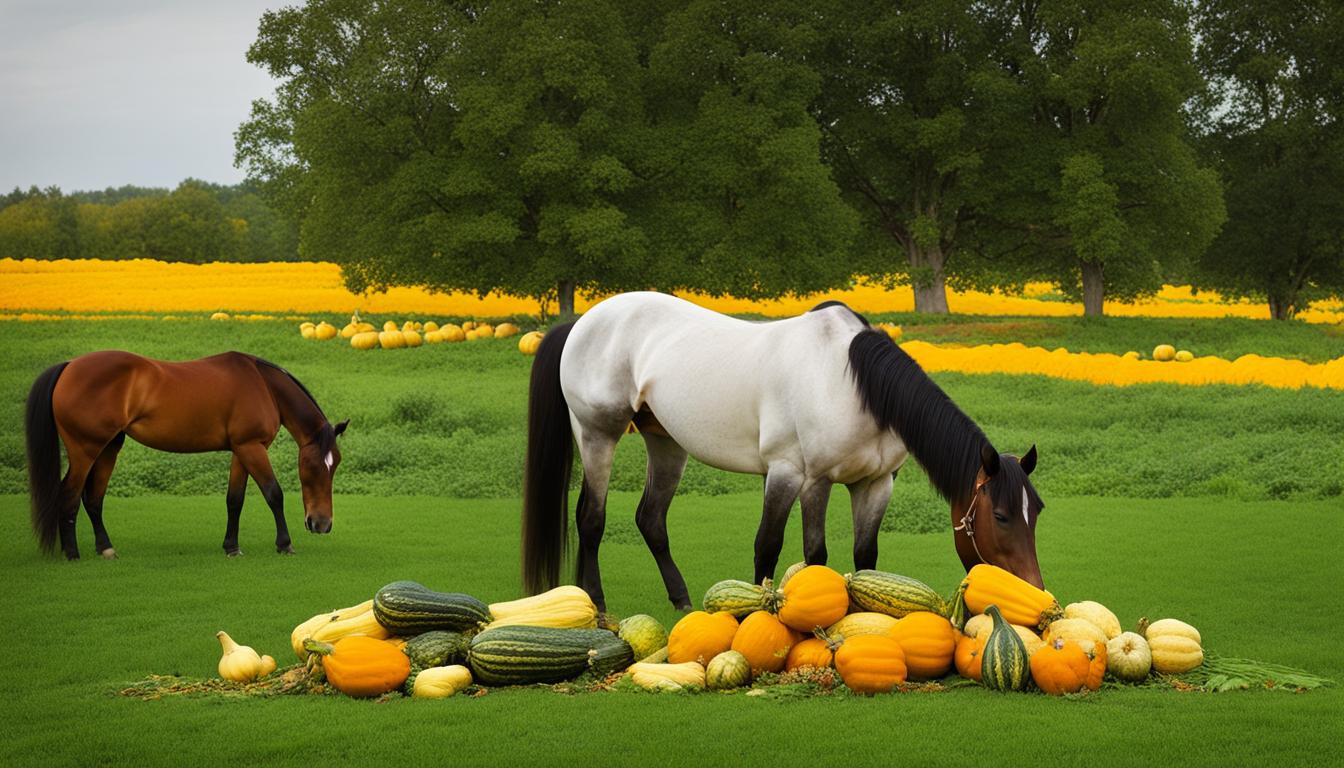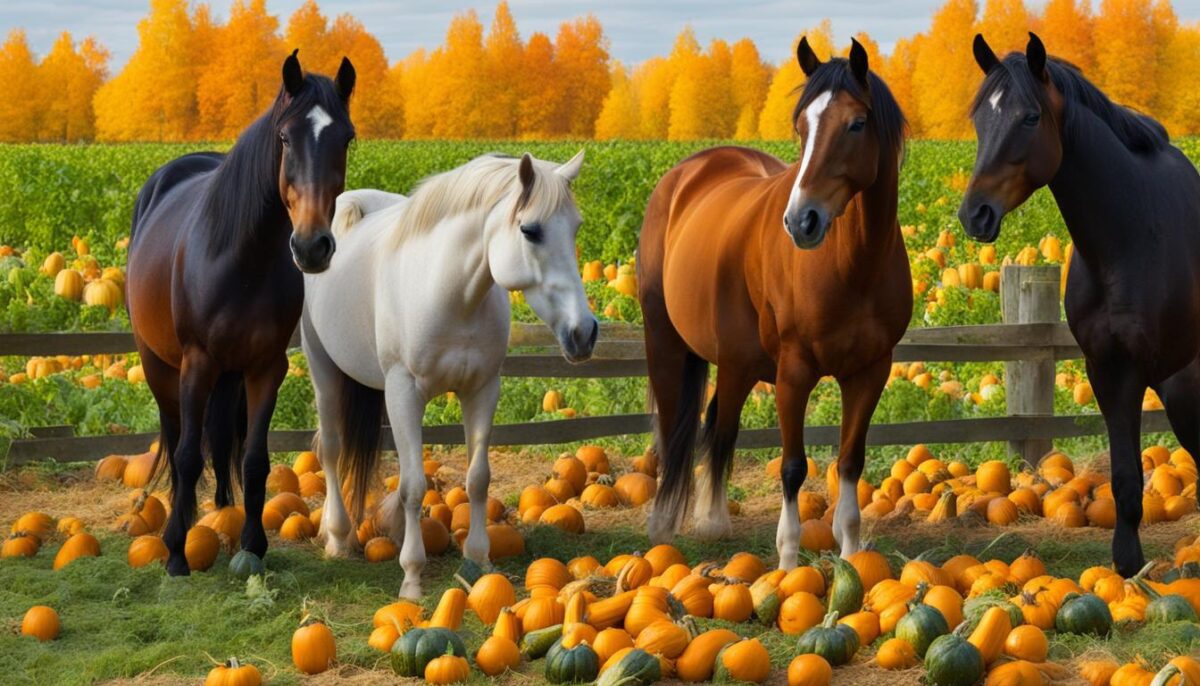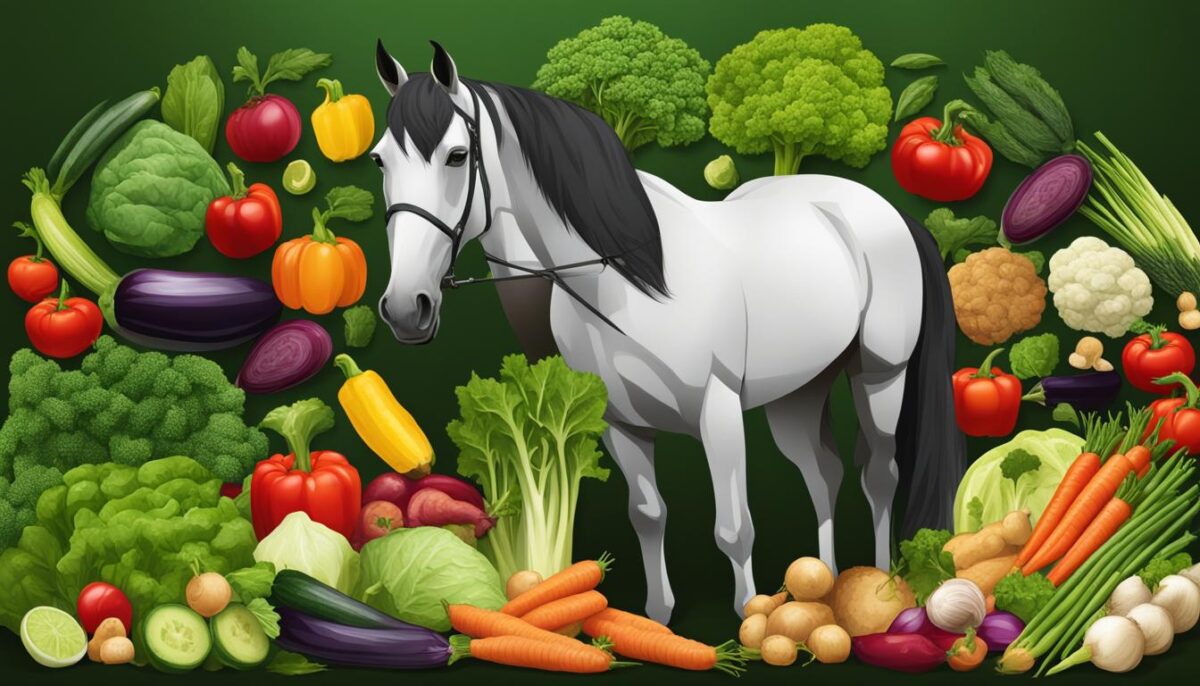If you’re caring for a horse, you probably ask yourself, “What safe foods can horses eat?” You’re not alone! People who love horses often want to treat them with something special. You might be surprised to learn that squash is one of those safe treats you can give your horse. It’s a colorful and yummy food that can be healthy for horses too!
It’s true, squash can be a part of your horse’s diet, but like any treat, it should be given in just the right amount. Even though squash is safe, eating too much of anything isn’t good for your furry friend. A piece or two can make a good treat for your horse every now and then—just not too much!
Remember, you know your horse best, so when you choose horse treats, always think about what’s best for their health. Squash for horses can be a tasty change, but let’s keep your horse happy and healthy with a balanced diet first!
Key Takeaways
- Squash is a good, safe food you can give to horses.
- Just like treats for people, squash should be given to horses in small amounts.
- It’s important to pick out a nice, ripe piece of squash, but leave the hard skin behind.
- A healthy equine diet needs to have more than just treats. It should have lots of different kinds of foods.
- Before you give your horse something new to munch on, it’s best to ask a vet to make sure it’s fine for your horse to eat.
Is Squash Safe for Horses?
When you think of appropriate horse treats, you might wonder, “Is squash a good choice?” The answer is yes, but remember the rule of thumb with squash safety — it’s all about balance!
Just like you enjoy a variety of foods, horses also appreciate a change in their snacks. Yet, your horse’s equine health is the priority. You can offer your horse pieces of raw and ripe squash as a special treat. But, be careful! It’s best to leave out the hard peel to keep your horse happy and healthy.
Always introduce new treats like squash slowly. This lets your horse’s tummy get used to it and prevents any upset.
Here’s the key: moderation. Squash can be great, but it should be a small part of what your horse eats. Think of it as an occasional delight, not the main event of their diet.
Does your horse have a special health need or condition? If so, chatting with a vet before changing their treats is smart. Some horses should not have squash if they have certain issues.
| Treats to Give | How to Serve | Things to Avoid |
|---|---|---|
| Squash | Raw and ripe, in small pieces | Large, hard peels and seeds |
| Carrots | Raw or slightly steamed, cut into sticks | Whole carrots (could cause choking) |
| Apples | Sliced, without seeds | Whole apples and large pieces (choking hazard) |
Remember, having a range of snacks is just like your plate at lunch—more colors usually mean more fun and better choices for keeping strong and smiling. Just like you, horses deserve a treat now and then that’s just right for them!
Benefits of Feeding Horses Squash
Hey there, horse lovers! Did you know that squash is not just yummy but also good for your horse? That’s right! Just like you enjoy a crisp apple or a juicy orange, squash can be a tasty snack for your horsey friend too. Here’s why squash is a great choice when you want to give your horse a little treat.
Hydration and Nutritional Value
When the sun is high, and the days are warm, your horse likes to stay cool and hydrated too. Squash is full of water which helps with equine hydration, keeping your horse feeling good when it’s hot outside. Not only is it like giving them a big drink of water, but squash is also a vitamin superstar! A few bites of squash and you’re giving your horse some squash nutritional benefits like vitamins A and C, which are great for keeping their eyes sharp and bodies strong. It’s definitely one of those vitamin-rich treats for horses that you’ll want to have in your snack bucket.
Seasonal Snack Variety
Just imagine eating the same food every single day – sounds boring, doesn’t it? Well, your horse thinks so too! That’s where the color, taste and fun of squash come in handy. Squash can be part of those special seasonal treats for horses. It’s a neat way to spice up their meals and keep things interesting. Offering different squash as snacks – like tasty pumpkin seeds in the fall – is a simple way to make your horse’s menu more exciting. Remember, a diverse horse diet isn’t just good for their taste buds; it’s good for their health too!
| Squash Type | Season | Benefits |
|---|---|---|
| Butternut | Fall | Rich in Vitamins A & C |
| Spaghetti | Winter | Fun Texture, Good Fiber |
| Acorn | Fall/Winter | Contains Potassium |
| Pumpkin | Fall | Hydration & Seeds for Snacks |
So next time you’re at the market, pick up a little squash for your four-legged buddy. They’ll love you for it, and you’ll feel good knowing you’re giving them a treat that’s just as healthy as it is delicious!
The Importance of Moderation in Equine Diets
When you give your horse treats, it’s like when you get a small prize for doing something good. Your horse feels happy and loved! But giving your horse too many treats isn’t a good idea. Just like too much candy isn’t good for you, too many treats aren’t good for your horse. You must be careful with moderation in feeding, making sure that treats are only a tiny part of what your horse eats.
-
Horse treat portions should be small, just like how you might get a single piece of candy, not the whole bag!
-
Horses need different kinds of food to stay healthy. They need a equine dietary balance, which is just like you eating fruits, veggies, meat, and bread to get all the vitamins and energy your body needs.
-
It’s important to remember that treats, even healthy ones like squash, are extras and not the main food for your horse.
Think of it as a special little “thank you” to your horse. This way, your horse stays healthy and has lots of energy to run and play!
Imagine if your plate had mostly candy and just a tiny bit of chicken or salad. You wouldn’t feel very good after a while, right? The same thing happens to horses. That’s why it’s key to keep those tasty squash pieces rare—they’re surprises, not daily snacks.
Remember, when you’re kind and give treats the right way, you help your horse live a happy and healthy life!
Understanding the Nutritional Needs of Your Horse
As a caring horse owner, it’s important to know what makes up a good diet so your horse stays happy and healthy. Horses need many different essential horse nutrients every single day. These include things like vitamins, minerals, and special building blocks called amino acids. Just like you wouldn’t eat only apples all the time, horses can’t eat just one kind of food either.
A smart horse diet choice involves a mix of foods to make sure your horse gets everything they need. It’s a big job to figure out if your horse is getting the right amount of equine nutritional values, but by looking closely at what’s in their food, you can do it. Let’s learn how to read feed labels together!
Required Daily Nutrients for Horses
To keep your horse at their best, focus on balancing their equine daily diet. Each meal should have the right stuff to keep their bodies strong and their energy high. Imagine trying to run fast and jump high if all you ate was sugar – it wouldn’t work out too well. Horses need a variety of foods for the same reasons you do, to look good, feel great, and have fun running around.
Some important parts of your horse’s diet are things like:
- Hay or grass – This is like the main part of their meals, kind of like your breakfast, lunch, and dinner.
- Grains – Sometimes, horses get these for extra energy, kind of like your snack when you’re really hungry.
- Vitamins and minerals – These are special helpers that make sure your horse can use all the good stuff in their food.
Reading Feed and Food Labels Accurately
When choosing what to feed your horse, you should become a food label detective. By interpreting feed labels, you can find out if the food will help your horse stay active and strong. The labels tell you what’s inside, just like when you look at the back of your cereal box to see what’s in it!
Here’s what to look for on the feed label to make sure your horse is not eating anything they shouldn’t:
- The section called “guaranteed analysis” will tell you about the most important parts, like how much protein and vitamins are there.
- The list of ingredients will show you everything used to make the food, so you know it’s all good stuff.
- Check to see if it has anything your horse shouldn’t eat. This is really important for keeping them healthy.
Remember, taking care of your horse means making sure they eat right. Keep learning about horse health maintenance, and have fun being the best friend your horse could ask for!
Alternative Treats and Snacks for Horses
Do you want to keep your horse happy with tasty snacks? It’s good to give them a change from their usual treats. Let’s look at some yummy and healthy horse treat options that are different from squash.
Healthy Treats Beyond Can Horses Eat Squash?
There are plenty of diverse equine snacks your horse might love. Think about things like apples or carrots. These alternative equine treats are safe for most horses. Remember to cut them up into small, easy-to-eat pieces. It’s important to check what is okay for your horse to eat, especially if they have special needs.
- Apples (without seeds)
- Carrots
- Bananas (peel off the skin first)
- Berries like strawberries or blueberries
Commercially Prepared Horse Treats to Consider
Did you know that there are also commercial horse treats made just for munching? These treats are super because they’re made to be safe and yummy. Some even have extra vitamins to help your horse stay healthy. Take a look at what’s inside these treats before you choose.
| Treat | Benefits | Good for Special Diets? |
|---|---|---|
| Minty Bites | Fresh breath | Yes |
| Gut Health Nuggets | Supports digestion | Yes |
| Herbal Wafers | Calming herbs | Check with vet |
| Apple & Oat Hearts | Tasty and crunchy | Mostly, yes |
When you pick a treat, look for one that fits your horse’s specialty equine diet. And always give treats in small amounts.
Maintaining a Balanced Equine Diet
Planning meals for your horse is like putting together a puzzle. Each piece is important. You want your horse to be happy and healthy, don’t you? That means giving them a mix of foods that fit just right. Squash can be a part of this picture, but it’s just one of many pieces.
Integrating Squash with Other Diet Components
Think about squash as a special addition to what your horse normally eats. When you’re adding it to their meals, do so slowly. This helps your horse get used to the new food without a tummy ache. Make sure the rest of their diet has a bit of everything they need. If you’re not sure how to mix it all up, asking a vet is a great idea. They can help you serve up the perfect dish for your horse’s nutrition.
Avoiding Harmful Foods for Horses
It’s not just about picking the right foods; it’s also about skipping the bad ones. Foods that are yummy for you might be a no-no for your horse. Keep things like chocolate, caffeine, and stick-on candies away from your horse because they can make them really sick. Also, say no to tomatoes, onions, and veggies like broccoli. These can upset your horse’s stomach. Stick with safe horse feeding practices and always check with a vet before you treat your horse to something new. This way you know you are not giving them something harmful.
FAQ
Can Horses Eat Squash?
Yes, horses can eat squash. It provides not only a delightful treat for your equine friend but also delivers important nutrients. However, it should be fed in moderation and introduced gradually to avoid digestive issues.
Is Squash Safe for Horses?
Squash is safe for horses when given as a treat in small quantities. The squash should be raw and ripe, but the hard peel should be avoided to prevent choking and other digestive troubles. If your horse has specific metabolic conditions, consult your veterinarian before adding squash to its diet.
What are the Hydration and Nutritional Benefits of Feeding Squash to Horses?
Squash can be quite hydrating for horses, making it a suitable snack, especially during warmer months. It is also packed with vitamins that can be beneficial for horses, provided it complements a balanced diet.
Why is Squash Considered a Good Seasonal Snack for Horses?
Squash can add variety to a horse’s diet with its different types and flavors. Seasonal treats like squash and pumpkin seeds keep the horse’s diet interesting and can be given raw or roasted in moderation.
How Important is Moderation in Equine Diets When Feeding Treats Such as Squash?
Moderation is key in equine diets, particularly with treats. Squash and other treats should be given in small amounts and should not replace the substantial feeds that provide the significant nutrients horses need. Too many treats can lead to under-nourished horses that lack energy.
What Daily Nutrients are Required for Horses?
Horses need a variety of nutrients including vitamins, minerals, amino acids, and digestible protein. It’s important to have a diet that considers a wide range of nutrients to prevent deficiencies and maintain overall horse health.
How Should You Read Feed and Food Labels for Horses Accurately?
When evaluating horse feeds and treats, always focus on the guaranteed analysis section and the full ingredient list. This ensures that the feed contains digestible protein and beneficial ingredients, reducing the risk of adverse effects on your horse’s health.
What Healthy Treat Options are Available for Horses Beyond Squash?
In addition to squash, horses can enjoy a variety of natural treats like apples, carrots, and other fruits and vegetables that are safe for equine consumption. Always match treats to the dietary needs and health condition of each individual horse.
Are There Any Commercially Prepared Horse Treats That Could Be Beneficial?
Yes, there are commercially prepared treats specifically formulated for horses. These treats can provide benefits such as supporting gut health, stimulating appetite, or helping with the horse’s respiratory system, but should be included in moderation.
How Can You Integrate Squash with Other Diet Components for a Balanced Equine Diet?
When integrating squash into your horse’s diet, make sure it’s part of a varied diet that includes all the necessary nutrients the horse needs. Introduce it gradually alongside other diet components to ensure a balanced intake.
What Harmful Foods Should Be Avoided in a Horse’s Diet?
Certain foods can be toxic to horses and should never be included in their diet, such as chocolate, caffeinated products, some sticky candies, tomatoes, onions, and cruciferous vegetables like broccoli. Always consult with a veterinarian before introducing new foods to your horse’s diet to ensure safety.


